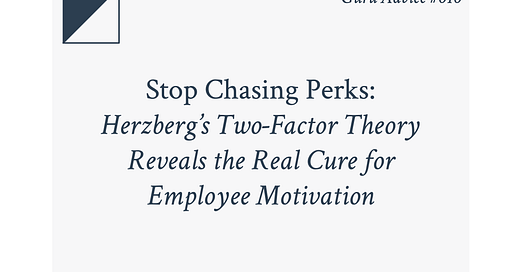Stop Chasing Perks: Herzberg’s Two-Factor Theory Reveals the Real Cure for Employee Motivation [Guru Advice #010]
Advice from the World's Best Leadership and Management Thinkers
👋 Welcome to a 🔒 subscriber-only edition 🔒 of our Guru Advice newsletter. Every Thursday, we explain the key elements of advice from the World’s best leadership and management thinkers. (We share our best free content on LinkedIn).
See all of Gura Advice editions here.
When Frederick Herzberg examined why people enjoy—or endure—their jobs, he arrived at a blunt conclusion: salary, coffee machines, and free yoga will never switch on lasting motivation. These so-called hygiene factors only prevent dissatisfaction. They keep the workplace from becoming miserable, yet they rarely kindle passion. To trigger genuine energy, leaders must supply a second set of conditions he called motivators: meaningful achievement, recognition, growth, and responsibility.
Herzberg’s research, first published in the 1950s, remains unnervingly fresh. Many firms still pour resources into office frills, hoping morale will soar. The results seldom last. A pay rise delights for a month, perhaps two, before felt needs return to baseline. Herzberg warned that piling on perks can trap leaders in a hedonic treadmill, always upping the ante without touching the deeper drivers of engagement.
Keep reading with a 7-day free trial
Subscribe to Leaders of the People to keep reading this post and get 7 days of free access to the full post archives.


